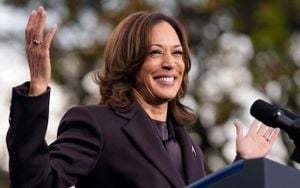Trump's supporters, particularly voters of color, have sparked significant debates, raising questions about their motivations and the implications of their choices. The narrative around Trump's victory encompasses complex layers of identity, race, and economic concerns, challenging the traditional view of racism as the decisive factor influencing voter preferences.
Black supporters of former President Donald Trump, especially those from Michigan, have publicly rejected the notion posited by some observers, including former President Barack Obama, which suggests Black men’s lack of support for female candidates — particularly Kamala Harris — stems from ingrained misogyny. Leslie Jones, one such voter, expressed her frustration with this perspective, stating, "I think it's very insulting because we have our own mind." Jones highlighted her rejection of Harris's policies rather than her identity as the reason for her vote. This sentiment was echoed by other Trump supporters, who argued the focus should be on the policy issues rather than racial or gender biases.
Professional broker Robin Barnes also chimed in, pointing out the tactic of fear-mongering employed by political commentators to sway voters' opinions. She criticized narratives claiming Black and Hispanic men are inherently racist or misogynistic simply because they supported Trump's candidacy. Instead, she emphasized the importance of voters making informed decisions based on policies rather than emotions driven by identity.
Further analysis shows significant demographic shifts among minority voters favoring Trump. For example, exit polls reveal notable increases among Latino and Asian voters. According to Edison Research, 46% of Latinos cast their votes for Trump, marking a 14-point uptick from the previous election. Asian American support also showed growth from 34% to 39%. These numbers are seen as a departure from the anticipated bloc voting typically expected from these demographics.
The broader electoral environment shows not just shifts among traditionally Democratic groups but also signals potential vulnerabilities within the party. For many Latino voters, the connection to Trump's anti-immigration policies may feel more abstract, leading them to prioritize economic stability over racial identity. Paola Ramos, a journalist, suggests this group doesn’t automatically reject candidates based on racist remarks but rather weighs their personal situation, indicating nuanced voting behaviors among minority groups.
Trump's racially charged rhetoric seems to have created cognitive dissonance among voters, especially within communities of color. While many express discomfort with his remarks, they simultaneously align with his stances on economic issues. This reflects the idea articulated by Heather McGhee, who describes America's zero-sum mentality where gains by one group are viewed as losses for another. This mindset can lead individuals to prioritize racial identity over policies they might otherwise find beneficial.
Interestingly, conversations on platforms like The View highlight this clash of perspectives. Hosts like Sunny Hostin argue racism and misogyny are systemic issues, reinforced by real electoral data showing stark differences in voting patterns along racial and educational lines. Her colleague Alyssa Farah Griffin contended, emphasizing the desire for economic improvement is equally, if not more, relevant to why individuals might support Trump.
The reality is complex. While 85% of Black voters still supported Harris over Trump, there is growing concern about the perception of race and politics. Political scientist Andra Gillespie notes significant differences between Black voters compared to the trends observed among Latino or Asian demographics, pointing out there hasn’t been the same level of realignment among Black communities. This hints at resilience against shifts favoring Trump, contrasting with Latino groups who appeared more willing to embrace his platforms.
Overall, the conversation about Trump's electoral gains is less about unequivocal support and more about shifting dynamics of acceptance based heavily on immediate concerns. The narrative surrounding Trump's supporters of color invites us to reconsider what drives voter allegiance, encouraging dialogue around policies rather than reductive assumptions about racism or sexism. The evolution of these discussions may contribute to reshaping party strategies as they navigate increasingly diverse electorates, grounded not just in identity, but also within the broader economic and cultural landscapes.



